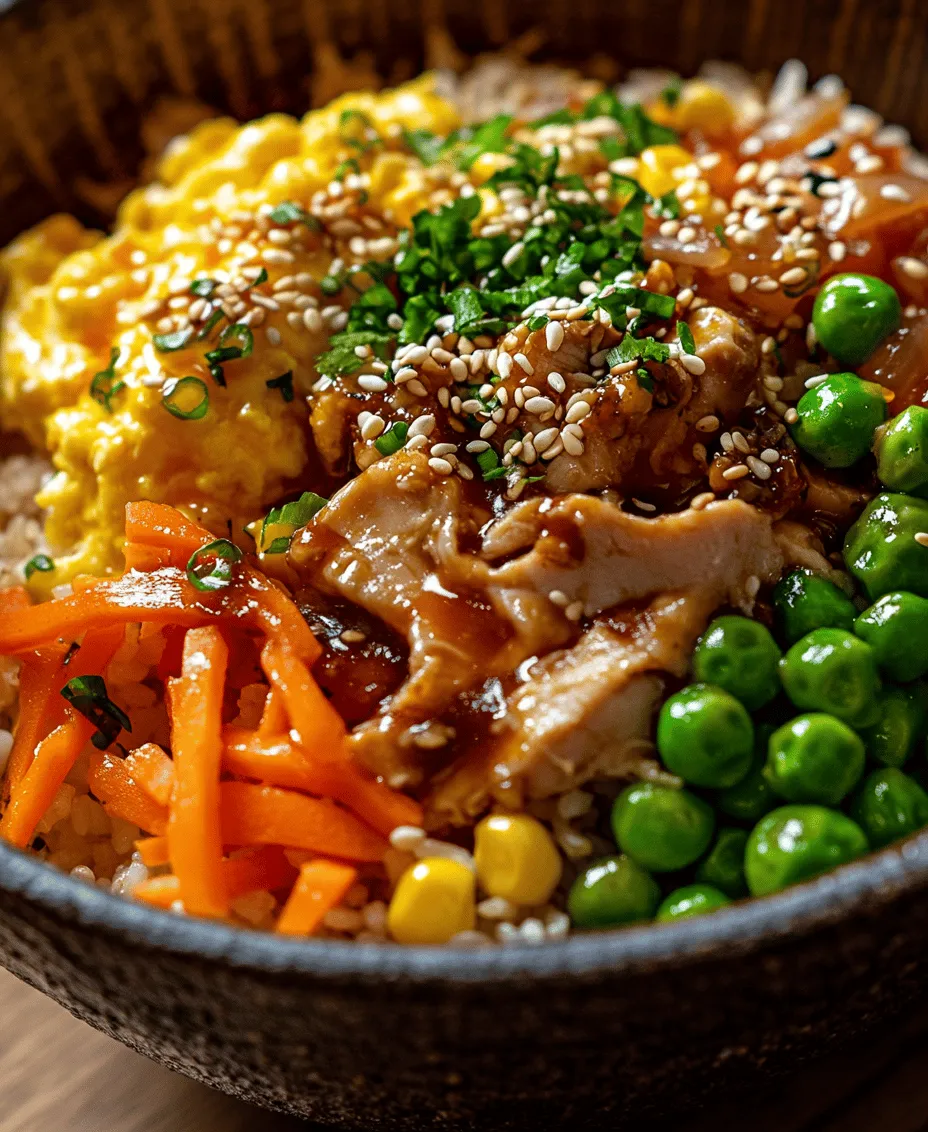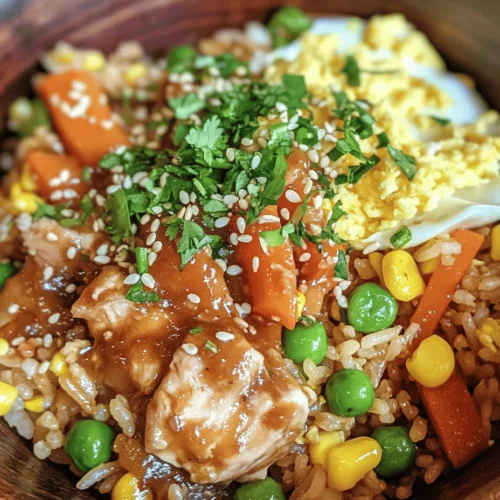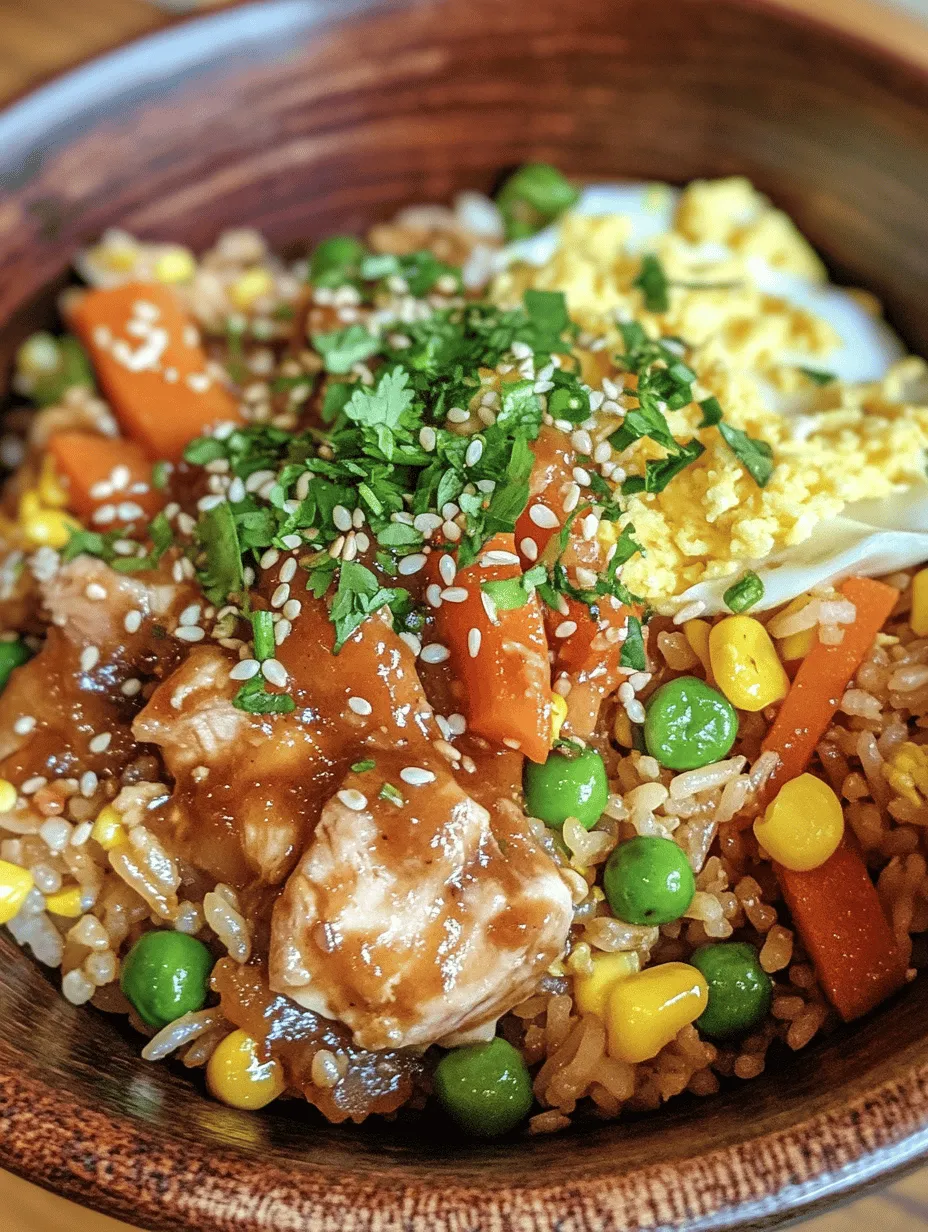Introduction
Fried rice is a beloved staple in many Asian cuisines, but when it comes to Japanese interpretations, there’s something uniquely satisfying about its flavors and textures. One standout dish that embodies this culinary tradition is the Savory Japanese BBQ Chicken Fried Rice Extravaganza. This dish is a delightful fusion of tender chicken, vibrant vegetables, and perfectly cooked rice, all harmoniously blended together and infused with the rich umami flavors characteristic of Japanese cooking.
What makes this chicken fried rice truly extraordinary is not just its taste but also its versatility. It serves as a fantastic weeknight dinner, a fulfilling lunch, or even a side dish for gatherings and parties. The appeal lies in its quick preparation, allowing home cooks to whip up an impressive meal in no time. Whether you’re a busy professional or a parent looking to feed the family, this dish promises not only delightful flavors but also a satisfying dining experience.
Understanding the Ingredients
Overview of Key Ingredients
To create a memorable Savory Japanese BBQ Chicken Fried Rice, it’s crucial to understand the key ingredients that contribute to its flavor profile. Each component plays a vital role, from the rice to the chicken and the vegetables.
Jasmine Rice and the Preference for Day-Old Rice
When it comes to fried rice, the type of rice used can make a significant difference. Jasmine rice, known for its delicate floral aroma and slightly sticky texture, is an excellent choice for this dish. However, the best results come when using day-old rice. Freshly cooked rice tends to be moist and clumps together, making it difficult to achieve the desired fluffy texture. By using day-old rice, the grains have time to dry out, resulting in a more distinct separation that allows for perfect stir-frying.
The Role of Chicken Thighs
For this recipe, chicken thighs are preferred over chicken breasts for their tenderness and flavor. Thighs contain more fat, which not only keeps the meat juicy but also infuses the fried rice with a rich, savory taste. When cooked correctly, chicken thighs provide a satisfying bite that complements the other ingredients beautifully.
Marinades and Sauces
Importance of Teriyaki and Soy Sauce
No Japanese dish is complete without the rich, sweet, and savory flavors of teriyaki and soy sauce. These sauces are essential for marinating the chicken, enhancing its flavor and ensuring that each bite is packed with umami goodness. Teriyaki sauce, with its blend of soy sauce, mirin, and sugar, provides a glossy finish and a subtle sweetness that balances the salty notes of soy sauce.
Optional Ingredients: Mirin and Sesame Oil
To elevate the flavors even further, consider incorporating mirin and sesame oil into your marinade and cooking process. Mirin, a sweet rice wine, adds depth and a hint of sweetness, while sesame oil contributes a nutty aroma that is quintessential in Asian cooking. These ingredients are not mandatory, but they certainly enhance the overall flavor experience.
Vegetables and Aromatics
Nutritional Benefits of Mixed Vegetables
In addition to the chicken and rice, a colorful array of mixed vegetables is essential for adding nutrition, texture, and visual appeal. Common choices include carrots, peas, bell peppers, and corn. These vegetables not only bring vibrant colors to the dish but also pack a punch of vitamins and minerals, making your fried rice a well-rounded meal.
The Significance of Garlic and Green Onions
Garlic and green onions serve as the aromatic backbone of this recipe. Garlic, with its robust flavor, adds depth, while green onions provide a fresh, crisp finish. Together, they create a harmonious balance that elevates the dish and fills your kitchen with a mouthwatering aroma as it cooks.
Step-by-Step Preparation Guide
Marinating the Chicken
The first step in creating savory Japanese BBQ Chicken Fried Rice is to marinate the chicken. This process is crucial, as it enhances the flavor and tenderness of the meat. Start by cutting the chicken thighs into bite-sized pieces. In a mixing bowl, combine the chicken with a mixture of soy sauce, teriyaki sauce, and optional ingredients like mirin and sesame oil. Ensure each piece is well-coated, then let it marinate for at least 30 minutes, allowing the flavors to penetrate the meat.
Cooking the Chicken
Once the chicken has marinated, it’s time to cook it to perfection. Heat a large skillet or wok over medium-high heat, adding a splash of oil to prevent sticking. Once the oil is hot, add the marinated chicken pieces in a single layer, making sure not to overcrowd the pan. For optimal stir-frying, the chicken should sizzle upon contact with the pan. Cook for about 5-7 minutes, stirring occasionally, until the chicken is golden brown and cooked through. The key to achieving a perfect stir-fry is to maintain high heat, ensuring a nice sear while keeping the chicken tender.
Scrambling the Eggs
Next, it’s time to add the eggs, which are a classic component of fried rice. In a separate bowl, whisk two large eggs with a pinch of salt. Push the cooked chicken to one side of the skillet and pour the beaten eggs into the empty space. Allow the eggs to sit for a few moments before gently scrambling them with a spatula. The goal is to achieve fluffy scrambled eggs that are still slightly soft, as they will continue to cook when mixed with the rice. Once fully cooked, combine the eggs with the chicken and set aside.
Sautéing the Vegetables
With the chicken and eggs prepared, it’s time to sauté the vegetables. In the same skillet, add a bit more oil if necessary and toss in your mixed vegetables, starting with those that take longer to cook, such as carrots and bell peppers. Stir-fry for about 2-3 minutes, ensuring the vegetables remain crisp and vibrant. Add in the garlic and green onions, cooking for an additional minute until fragrant. The goal here is to retain the vegetables’ natural crunch while infusing them with the delicious flavors from the chicken and aromatics.
Incorporating the Rice
Now comes the moment we’ve all been waiting for—incorporating the rice. Add the day-old jasmine rice to the skillet, breaking up any clumps with your spatula. Mix everything together thoroughly, ensuring that the rice is coated with the sauces and flavors from the chicken and vegetables. This step is crucial for achieving an evenly seasoned dish. Continue to stir-fry for about 3-4 minutes, allowing the rice to heat through and develop a slightly crispy texture. For an extra boost of flavor, drizzle a bit more soy sauce over the rice, adjusting according to your taste preferences.
By following these detailed steps, your Savory Japanese BBQ Chicken Fried Rice Extravaganza will soon come together in a whirlwind of flavors and aromas. Stay tuned for the final touches and serving suggestions that will make this dish truly unforgettable.

Techniques for Breaking Up Clumps and Achieving the Right Texture
When preparing fried rice, achieving the perfect texture is essential. Clumps can form if the rice is too moist or if it’s not handled properly during cooking. Here are some effective techniques to break up clumps and ensure each grain of rice is well-separated:
1. Use Cold, Day-Old Rice: Freshly cooked rice tends to be sticky, which can cause clumping. For the best results, use rice that has been cooked and then chilled in the refrigerator for at least a few hours or overnight. This helps to dry out the rice slightly and firm up the grains.
2. Break Up Rice Before Cooking: Before you start stir-frying, take a few moments to break apart any clumps in the cold rice with your hands or a fork. This step is crucial to prevent the rice from clumping together during cooking.
3. Heat Management: Use a hot wok or skillet to help evaporate moisture quickly. The high heat helps to seal the surface of the rice grains, preventing them from becoming mushy.
4. Use Oil Wisely: Adding a bit of oil to your pan before adding the rice helps to coat the grains and keep them from sticking together. Ensure that the oil is hot before adding the rice.
Combining Ingredients
Once you’ve prepared your rice and gathered all your ingredients, it’s time to combine them into a harmonious dish. The timing of adding each component is crucial for achieving optimal flavor and texture.
1. Start with Aromatics: Begin by sautéing diced onions and garlic in your hot pan. This will infuse the oil and begin building a flavor base.
2. Add Proteins: Next, incorporate your marinated chicken (or your choice of protein, if customizing). Stir-fry until cooked through and slightly caramelized, as this adds depth to the flavor.
3. Introduce Vegetables: After the protein, add your vegetables such as bell peppers, peas, and carrots. Stir-fry them briefly to maintain their crunch while allowing them to absorb the flavors of the dish.
4. Incorporate Rice: Finally, add the cold rice to the pan. Use a spatula or a wooden spoon to gently fold the rice into the mixture, ensuring that each grain is coated with the savory juices and seasonings.
5. Seasoning Timing: Add soy sauce and any additional seasonings towards the end of cooking to prevent burning and to enhance the flavor without overwhelming the dish.
Culinary Techniques and Tips
Stir-Frying Fundamentals
Stir-frying is an art that requires attention to heat management and the right tools. Here are some insights to elevate your stir-fry skills:
– Wok vs. Skillet: A traditional wok is ideal for stir-frying due to its shape and ability to hold heat. However, a large skillet can work just as well. Ensure that your cooking vessel has high sides to contain any tossing or flipping of ingredients.
– Preheat Your Vessel: Before adding any ingredients, make sure your pan is thoroughly heated. A hot surface is key to achieving that coveted sear on your proteins and veggies.
– Work in Batches: If you’re making a large quantity, consider cooking in batches. Overcrowding the pan can lower the temperature and lead to steaming instead of stir-frying.
Flavor Layering
Building flavors progressively is essential in creating a rich and satisfying fried rice dish. Here’s how to do it effectively:
1. Layering Ingredients: Start with aromatics, then proteins, and finish with vegetables. Each layer brings its unique flavor to the dish, allowing them to meld beautifully.
2. Season Gradually: Instead of dumping all seasonings at once, add them gradually. This allows you to taste and adjust as you go, ensuring that each ingredient complements the others.
3. Finish with Freshness: Add fresh herbs or a splash of lime or lemon juice just before serving to balance the richness with a bright flavor.
Customizing Your Fried Rice
One of the best aspects of fried rice is its versatility. You can easily adapt the recipe to fit your dietary needs or preferences:
– Protein Substitutes: If you prefer to keep it vegetarian, consider using tofu, tempeh, or even chickpeas. For a seafood twist, shrimp or scallops can also be delightful additions.
– Vegetable Variations: Feel free to include whatever vegetables you have on hand. Broccoli, zucchini, corn, and snap peas are all excellent choices that can add color and nutrition.
– Spice Level: If you enjoy a little heat, consider adding some sliced chili peppers or a drizzle of sriracha during the cooking process for an extra kick.
Presentation and Serving Suggestions
Garnishing Techniques
Presentation is key to making your dish visually appealing. Here are some garnishing techniques that can enhance your fried rice:
– Toasted Sesame Seeds: Sprinkle toasted sesame seeds over the top of your fried rice just before serving. They add a delightful crunch and a nutty flavor that complements the dish.
– Fresh Herbs: Chopped cilantro or green onions can add a fresh contrast and vibrant color to your fried rice, making it more inviting.
Serving Ideas
To elevate your meal experience, consider these pairing suggestions:
– Beverage Pairings: A refreshing iced green tea or a crisp lager can complement the savory elements of the fried rice. For those who prefer non-alcoholic options, a homemade ginger lemonade can be a delightful match.
– Side Dishes: Serve your fried rice with a side of miso soup or a simple cucumber salad to balance the meal with lighter flavors.
Nutritional Analysis
The Savory Japanese BBQ Chicken Fried Rice is not only delicious but also offers a variety of nutritional benefits:
– Protein-Rich: With chicken as the primary protein source, this dish supports muscle health and recovery.
– Vegetable Nutrition: The addition of colorful vegetables contributes essential vitamins, minerals, and fiber to your diet.
– Balanced Meal: This dish can provide a balanced meal when portioned correctly, combining carbohydrates from the rice, protein from the chicken, and a variety of nutrients from the added vegetables.
Portion Control and Balanced Eating
While fried rice can be a wholesome meal, it’s important to practice portion control. A serving size that balances protein, carbs, and vegetables can help maintain a healthy diet without overindulgence.
Cultural Significance of Fried Rice
Fried rice has a rich history in Asian cuisine, with various adaptations across cultures. In Japanese cuisine, fried rice, known as “chahan,” often features leftover rice and is a popular way to utilize ingredients efficiently.
– Historical Context: Traditional fried rice is believed to have originated in China, where it was a practical way to repurpose leftover rice and ingredients. The dish has since evolved, integrating unique flavors and cooking techniques from different cultures.
– Cultural Variations: Each culture has its take on fried rice, from Chinese Yangzhou fried rice to Indonesian Nasi Goreng, showcasing the dish’s adaptability and significance in home cooking worldwide.
Conclusion
Savory Japanese BBQ Chicken Fried Rice is more than just a meal; it’s a comforting and satisfying dish that brings together a medley of flavors and textures. The combination of well-seasoned chicken, vibrant vegetables, and perfectly cooked rice creates a delightful culinary experience that is easy to replicate at home.
This dish celebrates simplicity while allowing for creativity and customization, making it an excellent addition to any home cook’s repertoire. Whether you’re enjoying it as a weeknight dinner or impressing guests with a vibrant and flavorful dish, this fried rice is sure to please. Embrace the flavors, explore the variations, and make Savory Japanese BBQ Chicken Fried Rice a staple in your cooking adventures.



